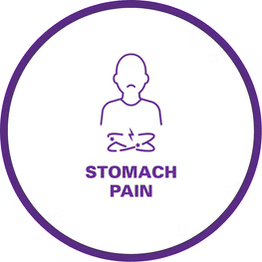Pancreatic Cancer Symptoms & Risk Factors
Pancreatic cancer often doesn’t cause any signs or symptoms in the early stages. This can make it hard to diagnose early. As the cancer grows, it may start to cause symptoms. The symptoms and how severe they are can vary for each person.
Knowing your risk factors and talking about them with your doctor may help you make more informed lifestyle and health care choices.
Common Symptoms of pancreatic cancer
Unexplained symptoms can be worrying for anyone. Here you will find information about some common symptoms of pancreatic cancer and how to manage them. It is important to note that having one or more of these symptoms does not necessarily mean that you have cancer, but if you have new or persistent symptoms that are out of the ordinary for you, it’s really important that you contact your GP to get checked out.
Pancreatic cancer can be difficult to detect due to the location of the pancreas. Symptoms are often vague and can be similar to other medical conditions.
The symptoms that people experience because of pancreatic cancer depend on the location of the tumour and the tumour type.





Managing symptoms
Click on the links below to learn about some ways you can manage these changes or symptoms:
Changes in diet
Many people find that sorting out symptoms related to their diet makes the biggest difference to how they feel. Ask your doctor or nurse for a referral to a dietitian. They can help you with finding food to eat that is gentle on your digestive system.
Nausea
Feeling sick (nauseous) is another common symptom. You may be prescribed anti-sickness medication, or you could try home remedies such as ginger, peppermint, or acupressure bracelets.
Fatigue
You are bound to feel tired or exhausted sometimes, so be kind to yourself. Make sure you rest and prioritise what you want or need to do. Give yourself permission to accept offers of help for chores that feel overwhelming. Although you might not feel like it, gentle exercise such as stretching, or a short walk can help combat fatigue.
Intimacy
People of all genders can lose interest in sexual activity during cancer treatment, at least for a time. Although it can feel awkward, talking to your partner about what you find intimate, or soothing can help. There are many ways to be intimate, such as cuddling or gentle touch, or using warmth and comforting language. Your GP may be able to assist with medication or a referral to see a sex and relationship therapist.
Stress, pain, and anxiety
Simple relaxation techniques can help you cope with stress, pain, and anxiety. Having a warm bath, deep breathing or listening to soothing music are easy things to do at home. You might want to try complementary therapies like reflexology or aromatherapy massage. Talking to others can also help. There are many cancer-specific psychologists available to you in New Zealand – ask your oncologist, nurse, or GP for a referral.
Keep perspective
Each individual will feel and react differently to treatment. What might work for someone else may not always work for you. Acknowledge that not every day will be as easy to manage as the last, and that every day may be different. Focus on what you know works for you and be very gentle with yourself.
Keeping active
Physical activity can also make you feel better, though how much activity will depend on how well you feel. Even a walk round the block or 10 minutes of stretching each day can help.
Risks of developing pancreatic cancer
Risk factors are things that increase the chances of developing cancer.
There are some known risk factors that can increase the chance of pancreatic cancer developing. Having a risk factor does not automatically mean that you will develop pancreatic cancer, but they do increase the likelihood of it happening.
Knowing your risk factors and talking about them with your doctor may help you make more informed lifestyle and health care choices.
Some risk factors are environmental and within your control which is why it is important to understand what they are.





Useful Websites & Patient Support
Information on these pages was collated with grateful assistance from the PanCare Foundation.
DISCLAIMER: Information provided by the Gut Cancer Foundation should be discussed with your healthcare professional and is not a substitute for their advice, diagnosis, treatment, or other healthcare services. In some cases, information has been gathered from Australian sources and should be discussed with New Zealand health care professionals.





